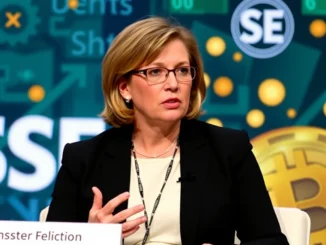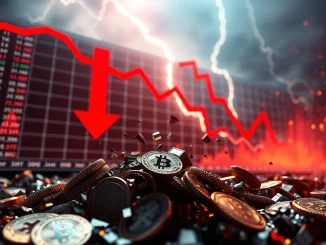
Major changes are underway for anyone involved in the virtual asset space in Dubai. The Emirate’s regulator is stepping up its game, particularly concerning high-risk activities like margin trading. If you’re operating or trading in the Dubai crypto market, these updates are crucial to understand.
Understanding the New VARA Rules
The Virtual Asset Regulatory Authority (VARA) in Dubai, the primary body overseeing the sector, has announced significant updates to its rulebooks. These changes target specific areas within the virtual asset industry that require more stringent oversight.
According to reports, the focus is primarily on the Broker-Dealer and Exchange Rulebooks. The goal is clear: enhance regulatory control and bring previously less-regulated segments under a tighter framework.
Key areas affected by the new VARA rules include:
- Margin Trading: Stricter requirements are now in place for activities involving leveraged positions.
- Broker-Dealers: Firms acting as intermediaries will face increased scrutiny.
- Digital Wallets: Providers of digital wallet services are also subject to enhanced supervision.
These updates reflect a global trend towards increased regulation in the crypto space, with Dubai positioning itself as a hub that prioritizes investor protection and market integrity.
Stricter Requirements for Crypto Margin Trading
One of the most impactful changes directly addresses crypto margin trading. This form of trading allows participants to borrow funds to increase their potential exposure to market movements. While it can amplify profits, it also significantly increases the risk of rapid and substantial losses.
VARA’s new rules introduce stricter controls on both leverage limits and collateral requirements. This means:
- Reduced Leverage: The maximum amount traders can borrow relative to their own capital will be lower. This aims to curb excessive risk-taking.
- Higher Collateral: Traders will likely need to put up more of their own assets (collateral) to support their leveraged positions. This provides a larger buffer against market volatility and reduces the risk of sudden liquidations.
These measures are intended to protect retail investors from the inherent dangers of high leverage and ensure that firms offering margin trading services maintain adequate financial stability.
Why Dubai is Tightening Crypto Leverage Rules
The decision to tighten crypto leverage rules is a strategic move by Dubai. As the Emirate seeks to become a leading global center for virtual assets, establishing a robust and credible regulatory framework is essential. Weak oversight of high-risk activities like margin trading could undermine confidence and attract unwanted speculative behavior.
By implementing stricter rules, VARA aims to:
- Enhance Investor Protection: Shielding traders, especially less experienced ones, from the potentially devastating consequences of excessive leverage.
- Improve Market Stability: Reducing the likelihood of rapid, cascading liquidations that can destabilize the market during periods of volatility.
- Foster Trust: Building a reputation as a jurisdiction where virtual asset activities are conducted responsibly and under clear guidelines.
- Align with Global Standards: Bringing Dubai’s regulatory approach closer to those being developed in other major financial centers.
This proactive approach signals Dubai’s commitment to fostering sustainable growth in its virtual asset sector, balancing innovation with necessary safeguards.
Broader Implications of Dubai’s Crypto Regulation Updates
While Dubai crypto regulation updates heavily feature margin trading, the changes extend to other areas. The enhanced supervision of broker-dealers and digital wallet providers indicates a comprehensive effort by VARA to gain better visibility and control over the entire virtual asset ecosystem operating within its jurisdiction.
For broker-dealers, this could mean more stringent licensing requirements, operational standards, and reporting obligations. For digital wallet providers, it might involve stricter Know Your Customer (KYC) and Anti-Money Laundering (AML) procedures, as well as technical and security standards.
These broader measures are crucial for preventing illicit activities, ensuring consumer asset safety, and creating a level playing field for regulated entities.
What Do These Changes Mean for You?
If you are a virtual asset service provider (VASP) or a trader in Dubai, these rule changes require careful attention. VASPs, including exchanges, broker-dealers, and wallet providers, must review VARA’s updated rulebooks to ensure full compliance. This may involve adjusting their operational procedures, risk management frameworks, and technology systems.
For traders, particularly those engaging in margin trading, it means adapting to potentially lower leverage options and higher collateral requirements. Understanding these new parameters is vital for managing risk effectively within the Dubai market.
Staying informed about regulatory developments like these is paramount for navigating the evolving virtual asset landscape safely and compliantly.
Conclusion
Dubai’s VARA is taking decisive steps to strengthen its regulatory framework for virtual assets. The introduction of stricter rules for crypto margin trading, coupled with enhanced oversight of broker-dealers and digital wallets, underscores the Emirate’s commitment to building a secure and reputable virtual asset hub. These measures are designed to protect investors, ensure market stability, and foster long-term growth in the Dubai crypto sector. As the virtual asset space matures, robust regulation plays a key role in its widespread adoption and success.



